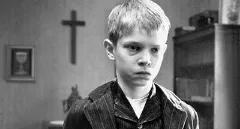It is rare to see such a dull movie, and it is rare to see such a shocking movie.
The film White Ribbon, directed by Austrian director Haneke, won several awards, including the Palme d'Or at the 2009 Cannes Film Festival. The film uses the memories of a rural teacher as a narrative perspective, telling a series of bizarre past events in a village in northern Germany on the eve of World War I. Doctors were injured by tripping over ropes while riding home, and the death of a tenant farmer's wife in an accident, the perpetrators of all these vicious incidents have been slow to investigate, while arson cases and beatings against children in villages continue to occur. Along with the investigation process of the protagonist village teacher, this village hiding all kinds of violence is gradually revealed. A peaceful German village, but full of dangers; a group of ordinary villagers, but entangled in grievances; a group of naïve teenagers, but cruel and evil. In the whirlpool of good and evil, behind a pair of deep eyes hides untold secrets, and evil souls lurk in the dark houses.

The director slowly opens the spiritual core of the closed village, and the original evil in the remote countryside is depressed, erupted, and spreads, brewing into a hotbed of fascist generation, and this village is the epitome of pre-war Germany. Children who look innocent and innocent, growing up drinking wolf's milk in this deformed environment, became the main force of the First and Second World Wars.
Marx said in the German Ideology that it is not consciousness that determines life, but that life determines consciousness. This sentence can sum up the whole theme of this movie. Director Haneke seems to be vaguely revealing the long process of the deformity of a group of children, but in fact he is using a village as a miniature to explore the growth history of a violent Germany. Western critics therefore gave the film a very apt title: "Nazi Childhood".
In order to fully reveal this closed village that operates like a machine, the film sets up 6 families: doctors, priests, barons, baron assistants, baron nannies, and farmers. Doctors heal and save people, priests redeem the spirit, and barons dominate property. Every family is centered on a strict father: a doctor with a straight face, a harsh priest, a baron with absolute authority... And it is beneath this seemingly calm and solemn exterior that this undercurrent of the village is actually full of revenge, adultery, incest, jealousy... The entire village is shrouded in the shadow of hatred and evil. Until the end of the film, it is still unknown who the real murderer is, but the audience has understood that it does not matter. The outbreak of any event can be traced back to the source, and the director is looking for the root cause of violence and evil, not the murderer himself.
The film ends with a profound meaning: when the hypocritical priest forcefully stops the village teacher from pursuing the truth, the village regains a peaceful scene, and the wolf genes of the evil children are successfully hidden. But the two world wars that followed were the "masterpieces" of the atrocities committed by these children who spread poison as adults, which made Germany, which did not know how to reflect before, taste the bitter fruit. The mental abscess that is not squeezed out will eventually ulcerate. For China, which has also experienced various sports disasters, is it impossible for Chinese to understand such a familiar alarm bell? ★
About the Author: Wang Long, a famous writer, scholar of literature and history, and a member of the Chinese Writers Association, has created and published long-form historical documentary literature such as "Heaven Towards the Left, The World to the Right", "The Inflection Point of National Fortune", "The Distant Figure", "The Fate of Mountains and Rivers", as well as the long-form military-themed reportage "Lies Written by the Bayonet - The Truth of the Japanese "Pen Troops" in the War of Aggression against China", "The Late Medal", "Tibet on the Snow Line" (co-authored) and many other works, and his personal works have been in the United Kingdom, Japan, Thailand, Hong Kong, Macao, and Other Works. Translators and distributors from Taiwan and other countries and regions have published various editions, and have participated in the writing of large-scale documentaries of the Central Propaganda Department, the State Administration of Press, Publication, Radio, Film and Television, and the Political Work Department of the Central Military Commission. He has won the Bingxin Prose Award, the Sichuan Literature Award, the PresenceIst Prose Award, and the Chinese Young Writers Award for Non-Fiction. Among them, works such as "Heaven Facing to the Left, The World to the Right" and "The Late Medal" have been listed as key support projects of the China Writers Association, and in recent years, more than one million words have been published in newspapers and magazines such as "People's Literature", "October", "Tianya", "Southern Weekend" and other newspapers and magazines, and have been selected many times in publications such as Xinhua Digest, Reader, and Writers Digest.